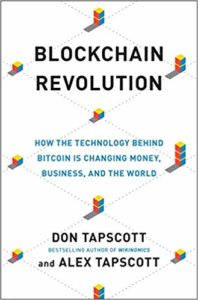11 Best Books on Bitcoin, Blockchain and Cryptocurrencies
Credit to Author: Ajit Bhojane| Date: Tue, 13 Aug 2019 12:36:54 +0000

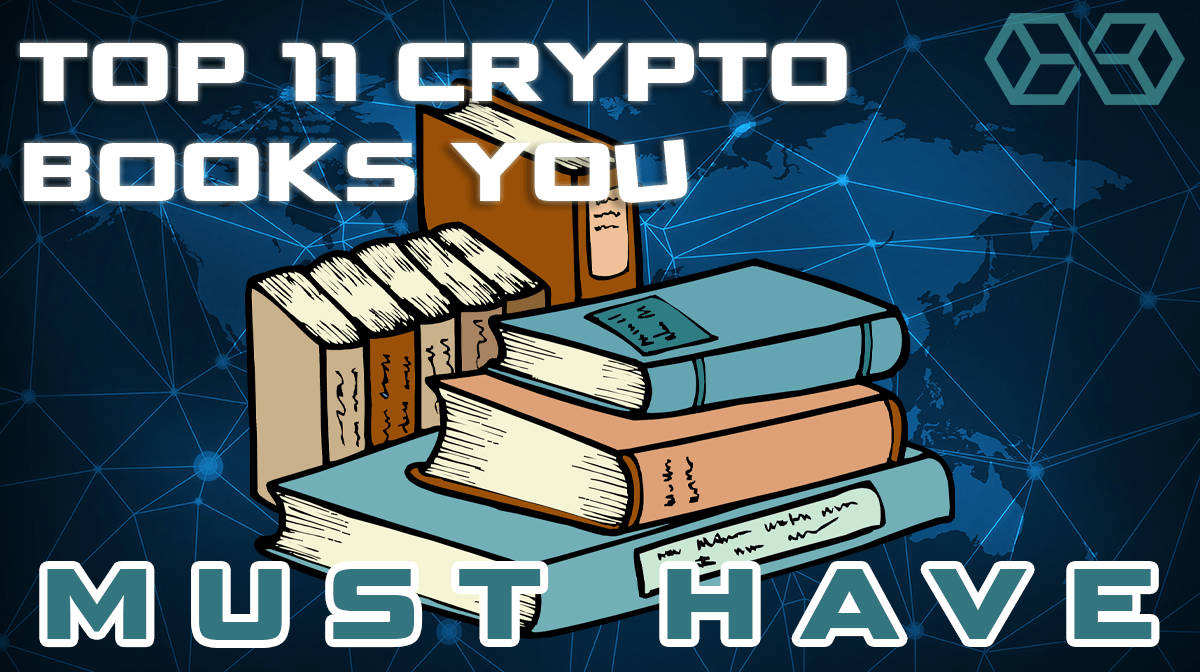
There’s no doubt that blockchain technology and cryptocurrencies are disruptive, and look set to bring about considerable changes in the world.
However, keeping up with the pace of change can be a struggle, especially for those who are not in the know.
That’s why I have put together this list of the 11 best Bitcoin, blockchain, and crypto-related books.

These books will expand your knowledge, and provide you with a great understanding of how these revolutionary new technologies work, and the impact they can have.
On top of that, these books also happen to be highly entertaining to read at the same time.
So without further ado, here is my list of the top 11 crypto books:
Digital Gold: Bitcoin and the Inside Story of the Misfits and Millionaires Trying to Reinvent Money
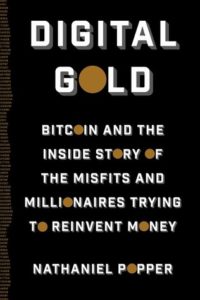
If you want to pick up a single book because you feel you missed the Bitcoin bandwagon, then this is the book for you. The best thing about this book is its narrative. You will start from ground zero and along the way, meet fascinating personalities who helped shape Bitcoin in its current form.
If you vaguely remember names such as Mt. Gox, Silk Road and want to get a recap of the same in an entertaining narrative, this book is for you.
It is the story of the many varied individuals- including cypherpunks, computer programmers, visionaries, libertarians, and anarchists who built the Bitcoin narrative.
It’s a fascinating story and worth binge-reading!
Bitcoin Billionaires: A True Story of Genius, Betrayal, and Redemption
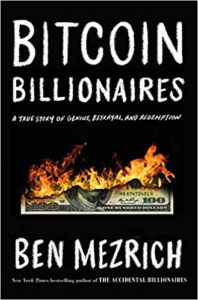
With a knack for writing in a narrative style, Ben Mezrich chronicles the journey of the Bitcoin Billionaires – the Winklevoss twins. The twins became well-known through their epic legal battle with Facebook’s Mark Zuckerberg.
Mezrich’s earlier book ‘The Accidental Billionaires’ and the subsequent movie ‘The Social Network’ depicts the hard-fought legal battle between Zuckerberg and the Winklevoss twins over the original idea of a Facebook-like social network. Eventually, it ended up with the twins receiving $65 million – the majority of it as Facebook stock.
‘The Bitcoin Billionaires’ book continues the story from there. Shunned by those in fear of getting on the wrong side of Facebook, the brothers were not welcome in Silicon Valley.
However, soon after they found their calling – Bitcoin! They were the early adopters of the Bitcoin phenomenon. Having settled the case, they bought 1% of all the existing Bitcoins in circulation in 2011 when it was dirt-cheap. When the price skyrocketed to $10,000 per Bitcoin, it turned them into billionaires.
This book narrates the events leading to it.
Bitcoin and Cryptocurrency Technologies
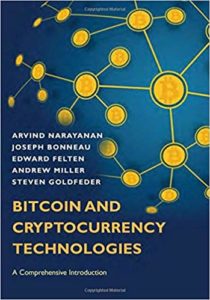
This book is written by a collection of authors including Arvind Narayanan, Joseph Bonneau, and more. All the authors are either professors or research graduates from Princeton, Stanford, and other prestigious universities.
The book’s intention is to make readers aware of how Bitcoin and blockchain technology work at a technical level. It is assumed that readers have a basic understanding of computer science, how computers work, data structures and algorithms, etc.
So, if you identify yourself as having such esoteric knowledge, it’s well worth a read.
By the way, it is also recommended on the Coursera course, ‘Transacting on the Blockchain’ delivered by Don Tapscott.
Mastering Bitcoin: Programming the Open Blockchain
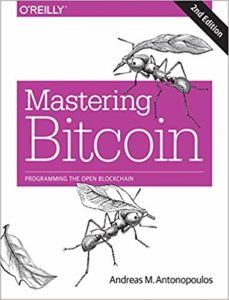
Andreas Antonopoulos is a respected name in the Bitcoin-blockchain world. He dons many hats. He is an Author, a Coder, a Public Speaker, and an entrepreneur – all blended in one. He is known for delivering talks that enmesh economics, psychology, technology with current events, and personal anecdotes. And, he has written a very technical book to understand the intricacies of the Bitcoin and blockchain.
Software programmers in the know consider this as the best book on the blockchain.
To fully understand Bitcoin, Antonopoulos examines it from the perspective of the people using it. Each of the characters like Alice, Carol, and Bob in the book illustrate specific use cases. From how to generate Bitcoin addresses using wallet services to making your first Bitcoin transaction, Antonopoulos clearly explains all aspects of Bitcoin.
It was first published back in 2014, but with the second edition out, it’s still the go-to book.
The Internet of Money: Volume 1 and Volume 2
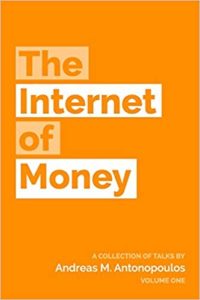
Antonopoulos’ first book Mastering Bitcoin was on the ‘what’ and ‘how’ of Bitcoin, explaining all the technical intricacies.
However, Antonopoulos’ second book The Internet of Money digs the ‘why’ of Bitcoin. It’s not a book, per se, but more of a compendium of Antonopoulos’ speeches at various forums, conferences, and universities.
These talks reflect the author’s worldview, political ideas, and hopes, as well as his technical fascination and unabashed geekiness.
We can surely say that the book provides an easy-to-read, short-story style overview of why Bitcoin matters.
Antonopoulos delves into the philosophical underpinnings of money. He puts forth new ideas such as currency as a language by which we express our values; or currency as an app; or a content type.
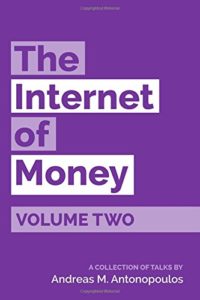
He gives an interesting example of how cars, when invented and introduced in the late 19th century, were resisted, contrary to our general belief, by most of the people. Cars were slower than horses, they broke down, and needed expensive gasoline. Every new technology is looked at with suspicion.
Digital Currencies are not any different.
If you read this book, you will understand Infrastructure Inversion (new technology which inverts the existing infrastructure), Interstitial Innovation (innovation in the gaps, the places where today’s systems cannot go) and so on.
Antonopoulos envisions a future where everyone can issue currency.
He has also published the second volume of The Internet of Money. His fourth book Mastering Ethereum, was also released in December 2018.
The Bitcoin Standard: The Decentralized Alternative to Central Banking
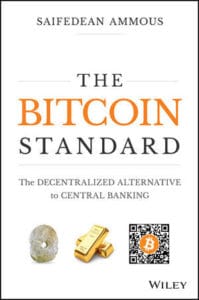
Saifedean Ammous is a professor of economics at the Lebanese American University and a Bitcoin economist. The book is written from the point of view of the Austrian school of economics. For the uninitiated, the Austrian school of economics emphasizes the complete freedom of individuals. It wants to abolish central banks; wants the gold standard to be reinstated, and wants minimal government oversight.
The book explores the history of money from barter exchange, through to the use of seashells, beads, and other mediums of exchange. The author puts forth the concept of sound money. Gold is sound money, whereas government-controlled central bank-issued currencies are unsound money. And, he categorically targets mainstream (Keynesian Economics) for all the excesses committed in the form of central banking shenanigans like quantitative easing and the monetization of government debt.
As it is written by an economist, it stays away from all the technical aspects of Bitcoin.
Therefore, grab the book if you want to understand Bitcoin and its significance from the point of view of a heterodox school of economics.
The Truth Machine: The Blockchain and the Future of everything
Michael Casey and Paul Vigna, both journalists at the Wall Street Journal, also authored The Age of Cryptocurrency back in 2015 which focuses primarily on a single application of Bitcoin’s core technology.
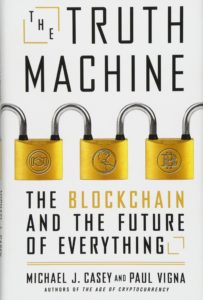
But technology is dynamic, and a lot had happened since then. Therefore, they decided to write and publish The Truth Machine in 2018.
The book begins at Azraq, a refugees camp set up in the Jordanian desert for Syrian people. It explains how the United Nations’ World Food Program is implementing a blockchain solution for the fair distribution of food in camps.
In another example, the authors cite a Tel Aviv-based, blockchain-powered ride-sharing application Commuterz which, unlike, Uber, doesn’t take a 25 percent cut.
The book talks about the promise of Internet 3.0, a re-architecting of the Net to assert the core objective of decentralization. Internet 2.0 unlocked the power of social networks but also allowed first-mover companies to amass the personal data of millions and become a monopoly power.
Casey and Vigna make the case of “Blockchain for good.”
In their own words:
It’s an interesting read!
Blockchain Basics: A Non-Technical Introduction in 25 Steps
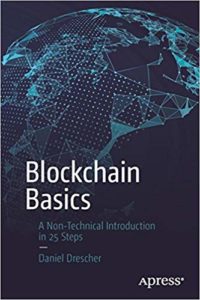
While there are many books which are primarily focused on the expected economic impact of blockchain technology.
To understand these specific blockchain applications, evaluate business cases, or its economic impact, a sound conceptual understanding of the technical foundations of blockchain is necessary. Blockchain Basics does an excellent job of providing this.
As author Daniel Drescher says, “The book is deliberately agnostic to the application of the blockchain.“
This is a welcome approach. All the technical concepts of the blockchain such as – transactions, hash values, cryptography, data structures, peer-to-peer systems, distributed systems, system integrity, and distributed consensus are explained. And they are explained in an easy to understand way that does not involve mathematics and formulas!
The Business Blockchain: Promise, Practice, and Application of the Next Internet Technology
With the foreword written by the Ethereum founder Vitalik Buterin, it shows that someone well connected in the industry authored this book.
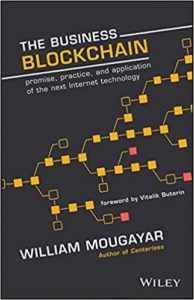
William Mougayar is a prolific researcher, writer, thought leader, and a blockchain business thinker. He has 34 years of experience in the technology sector.
Mougayar has been at the frontiers of business and the technology space. When he first heard about blockchain, he was apprehensive of its impact.
However, now Mougayar categorically believes that soon, the adage “Is it in the database?” will be replaced by “Is it on the blockchain?”
One salient feature of this book is that the basic concepts have been represented pictorially and graphically.
This book is a must-read if you want to learn about blockchain technology from the perspective of a business practitioner.
Blockchain Revolution: How the Technology Behind Bitcoin is Changing Money, Business, and the World
Don Tapscott is the CEO of Tapscott Group and the co-founder and Executive Chairman of the Blockchain Research Institute.
He has (co)authored sixteen books on the application of technology in business and society.
His son, Alex Tapscott is a globally-recognized writer, speaker, investor, and advisor focused on the impact of emerging technologies, such as blockchain and cryptocurrencies, on business, society, and governments.
Tapscott father-son duo states that in the present form:
Interestingly, they wanted to put the title as ‘The Trust Protocol.’
After reading this book, you will understand the importance of identity and the end of digital feudalism. Right now, we are casually handing over our data to big tech companies that monetize on it.
If we want to take control of our identities and personal data, blockchain technology is the way forward, says Tapscotts.
As the book mentions, we are witnessing one of the largest transformations of wealth in human history, from paper-based analog assets to digital ones.
Life After Google: The Fall of Big Data and The Rise of the Blockchain Economy
I have saved the best for last!
If you want a book which will drastically change your world-view, this is it!
And why is that?
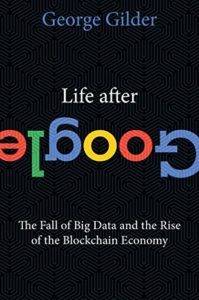
George Gilder is a prophetic visionary. He is an investor, writer, economist, and techno-utopian advocate. The author of over 17 books, most of his work beautifully enmeshes technology, economics, philosophy, and everything in-between written from a philosophical angle.
He wrote the “bible” of the Reagon revolution-the bestseller Wealth and Poverty.
By writing Microcosm, he predicted how the silicon chip would change our society – well, it did.
He also wrote Life After Television (1990) and Telecosm (2001) predicting the effect of ‘the infinite bandwidth’ in the near-future world.
He wrote The Scandal of Money in 2016, launching a scathing attack on the Federal Reserve, ‘Too-big-too-fail banks,’ the US government, and Wall Street.
From Claude Shannon’s information theory and Google-marxism to the forthcoming “cryptocosm,” you will find this book intensely in-depth and enriching.
Gilder posits that Google’s business model is not sustainable. The book points out that the rise of Google is the apogee of centralization.
Therefore, according to Gilder, the antidote comes in the form of the emergence of blockchain technology which will bring a new information architecture for a globally distributed economy – a sort of, as Gilder puts forth – “Cryptocosm.”
Give it a read!
Final Say
I hope you enjoyed my list of the best books out there on crypto and blockchain. Reading any of these for the first time is guaranteed to increase your knowledge, even if you already consider yourself an expert in the space. And with these books available as hard copies, ebooks, or audio files, there’s no reason not to enjoy them.
11 Best Books on Bitcoin, Blockchain and Cryptocurrencies was originally found on Cryptocurrency News | Tech, Privacy, Bitcoin & Blockchain | Blokt.
